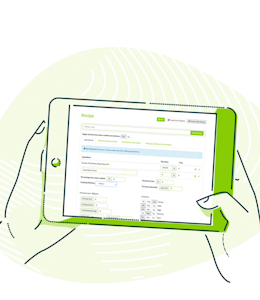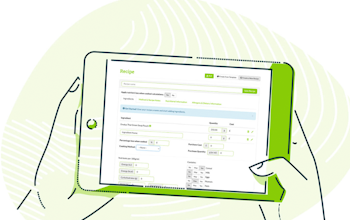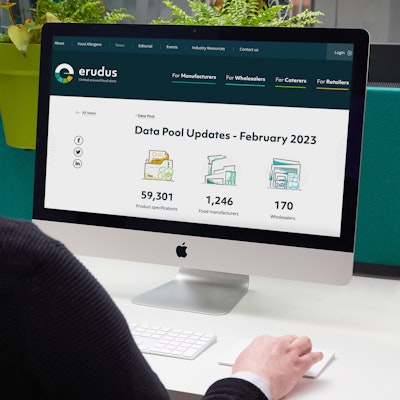The challenges for Public Sector Catering and how Erudus can help

Back in June we held a very successful Erudus User Forum, which had the theme “raising awareness and understanding of the challenges faced by Public Sector Caterers”. But why did we choose it? And what are we doing here at Erudus to help those in the sector, and our customers in general to overcome these challenges? Here we’ll be laying out everything you need to know…
Why did we start thinking about Public Sector Catering?
Recently we noticed a commonality between some of the questions we were being asked by our Users. Questions like:
- Can you ask all Manufacturers using Erudus to include fibre?
- Is it school approved?
- Is there an ESG survey for Wholesalers?
- What country does the meat used in the product come from?
- Is the Wholesaler I’m using an SME?
So, what is the connection between these questions? To find out, you have to look where they’re coming from.
Internal reporting highlighted 2 main channels for the requests:
FBO’s
Leading requests around Sustainability, Carbon, Accreditations and ESG.
You may also be interested in…


You may also be interested in…
Erudus Update: Erudus ESG survey for Manufacturers
ReadWholesalers
Driven largely by their Public Sector customers’ contracts and/or tenders.
We found Public Sector Catering just kept on popping up, so we decided it was time to do a deep dive into the subject...
Our findings
Whilst we can in no way claim to be experts in this field, we were able to notice a few key points:
Guidance - There’s a great deal of guidance floating around - depending on what type of public sector organisation you are: “Government and Buying Standards (GBS)”, “School Approved”, “National guidance for healthcare food and drink”, for example, all of which widens the data ask for organisations that fall within them.
Challenges - In addition to the usual challenges around budgets, staffing, sourcing, and availability, Public Sector Caterers now face further tests of their resources with increased initiatives around Sustainability, Health, and Food Safety.
Additionally, Food Business Operators and Contract Caterers active in the Public Sector are really trying to drive the sustainability aspects of food, and this is reflected in their increased data ask.
The Data Ask from Public Sector Catering
These are the data requirements increasingly important to those in Public Sector Catering:
Nutrient Targeting
- Kcal/kJ
- Salt
- Fat
- Fibre
Certifications
- Animal welfare
- Environmental production standards
- Supplier Credibility
- Marine Stewardship Council
Product claims
- No Added Sugar
- No Artificials
- Low Calorie
- High in Fibre
- Organic
- Fair Trade
Deeper ingredient/manufacturing understanding
- Fried during manufacture process
- Fish Type: Oily/White etc
- Milk Type: Whole/Skimmed etc
- Egg Source
Making this sort of information readily available will make life easier for those in Public Sector Catering, but it also benefits others in the supply chain - products from Manufacturers who provide this information are less likely to be overlooked for use within the sector, and Wholesalers who can readily share it are also more likely to win tenders.
As a Data Pool, Erudus can play a big part in bring it to fruition. Here’s what we’ve been doing to try and support the Public Sector, and in turn make things easier for all of our users.
What Erudus are doing
We’ve made the following changes, updates and improvements that will benefit Public Sector Catering to our platform:
You may also be interested in…


You may also be interested in…
New Enhancement: New accreditations list
ReadNew accreditations
The following Accreditations have been added to the Data Model:
- Roundtable on Responsible Soy (RTRS)
- Iceland Responsible Fisheries (IRF)
- GlobalG.A.P.
- Responsible Fisheries Management (RFM)
- Marine Eco-Label Japan (MEL Japan)
New nutritional attributes
Expanded Nutrition attribute subset
We have expanded the Nutrition attribute subset to include “As Prepared” and “per Serving as Sold”, with 108 new attributes added to the data model to support this.
Auto calculation feature added
Calculations on specifications didn’t always match the pack because of rounding guidance, so we are no longer auto calculating and displaying absolute “per serving” nutrition. Instead, Manufacturers can either add this manually or use the new “AUTO CALC” button, and then edit. This is intended to pave the way for more options for front of pack traffic light labelling.
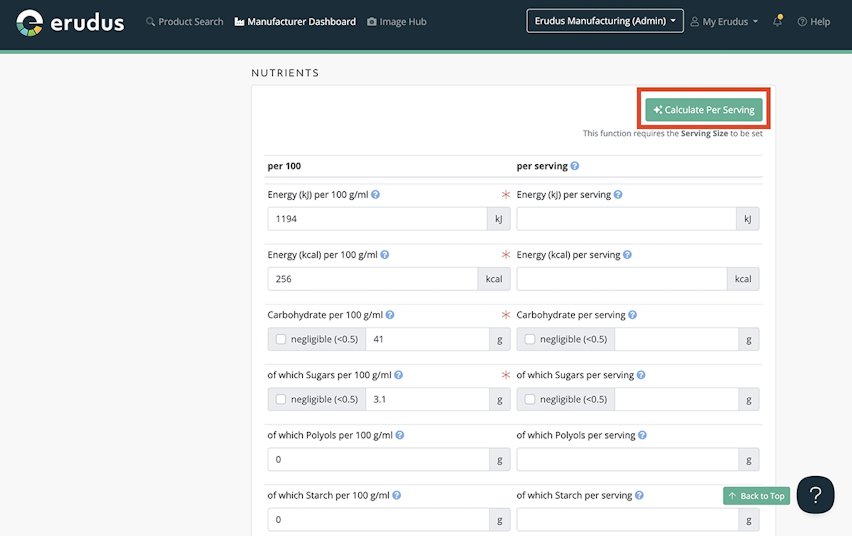
Origin/primary ingredient
We had received feedback that the standalone “Country of Origin” (i.e. where the product is produced) attribute was no longer adequate. This is because without any mandate for further information it’s possible for some companies to “Brit-wash” their products - occurring because industry-wide there has been something of a focus on promoting and buying British produce.
Consequently Erudus has introduced a mandatory “Origin of Primary Ingredient” attribute.
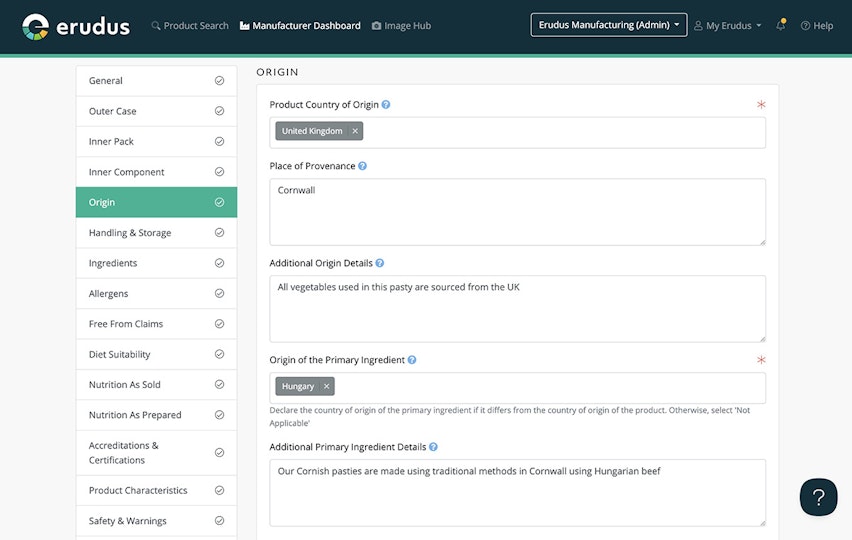
Single pack items
“Outer Case” and “Inner Component” data have always been mandatory, but not all products have both an inner component and outer case.
For example, a 15L drum of olive oil that comes on a pallet, not in cases.
As a workaround to accommodate this, users have traditionally either duplicated the data for inner and outer, or entered the minimum value for the mandatory attributes. Both of these accommodations can be misleading and cause confusion further down the supply chain, so to mitigate this, on Erudus, Manufacturers can now declare a product to not have an outer case or inner component.
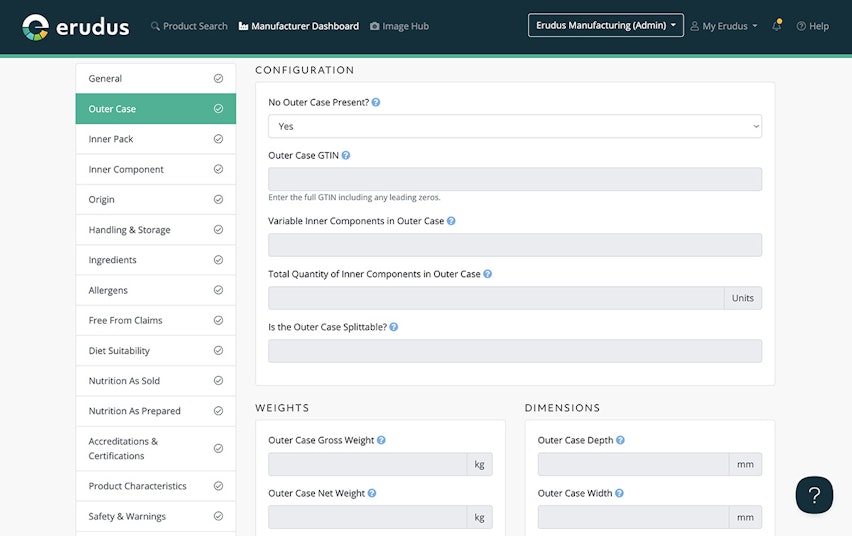
Save as Draft to Published Specifications
Historically, specifications could only be saved in a draft state, if publishing a new specification from scratch.
But multiple small changes to specs caused headaches for Wholesalers when reviewing product updates, while Manufacturers don’t always have all the information regarding changes to hand and work piecemeal to update specs.
As a solution, Manufacturers can now make draft changesto published specifications - you can find out more about this here.
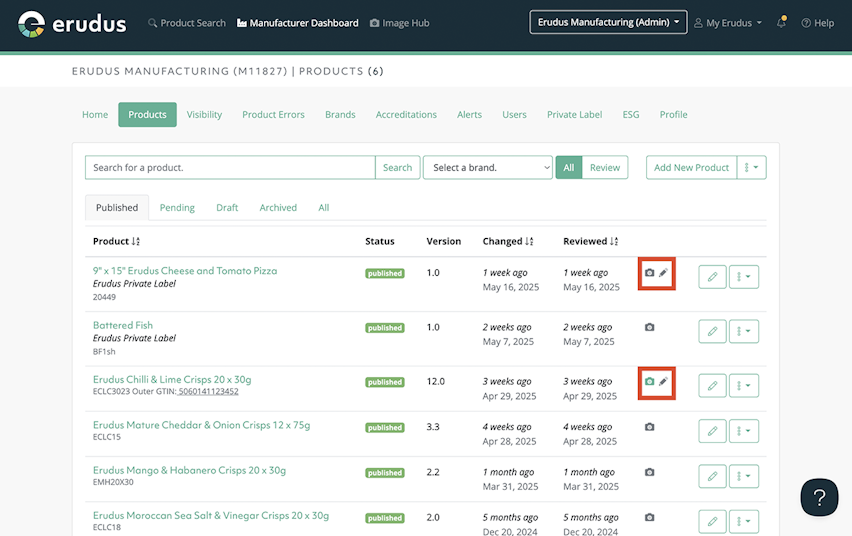
New specification image
Our Wholesaler users want greater image coverage, but not all Manufacturers are able to produce standardised, e-commerce imagery - causing rejections against our Image Hub standards.
We’ve now introduced a new, non-marketing image type called “Specification Image”, which allows a visual representation of the image but is not held to the marketing assets standards. So going forwards, when a specification image doesn’t meet standards, instead of being rejected it will simply be assigned to “Specification Image”.
New attributes
The following attributes have been added to the Data Model:
- Pallet GTIN
- Additional Waste Packaging (Straw, Clipstrip), Extended Material Paper (Moulded Fibre)
- Additional Product Categories (Paper, Ink (Non-Food))
- Additional Microbiological Standards Tests
- Modified Atmosphere Packaging (MAP)
- Deposit Return Scheme (DRS)
- Fish/Seafood Production Method (Caught at Sea, Caught in Fresh Water, Farmed)
Auto stepping local codes
We became aware that the rate of change in the Erudus Data Pool is greater than anticipated, and that all these product changes create a lot of admin work for Wholesalers.
Additionally, some Wholesalers are interested in major changes to a product, or any change even if minor, while others are only interested in the latest version of the product.
This led to them asking, can we simplify/automate this code stepping?
So we have introduced an Auto Step for Minor Changes and Auto Step for Major Changes.
You may also be interested in…


You may also be interested in…
New Feature - Revision & Version Control
ReadFuture functionality to support the public sector
And here’s a glimpse into what we hope to be adding in the future to further support the challenges faced by Public Sector Catering:
- Accreditations by Manufacturers (for Wholesalers) and accreditations Matrix - making it easier to see which Manufacturers have which accreditations
- ESG (Environmental, Social and Governance) for Wholesalers, which is useful for securing Public Sector tenders and handy for Manufacturers to view.
- A new and improved Recipe Builder
- A new Product Specification Type: Chemicals - this one is coming very soon! Check erudus.com/news for updates
- Managing images inside of the Product Editor - Image management will be integrated into the Product Editor to streamline the process. We also plan on providing Wholesalers and Manufacturers with reports that allow them to easily identify which products in their range have images published against them and which don’t


